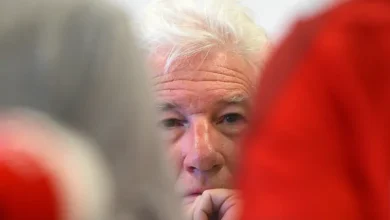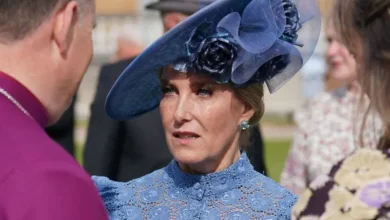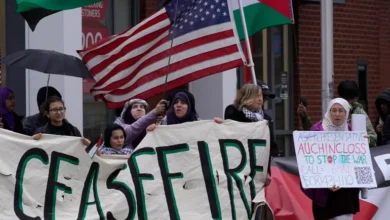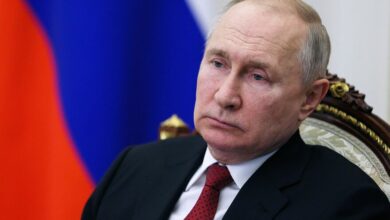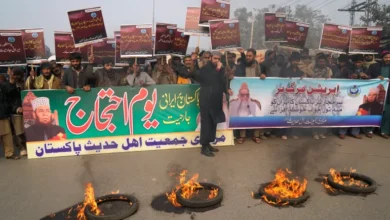‘The SNP is in crisis’: Scotland’s Humza Yousaf’s first 100 days
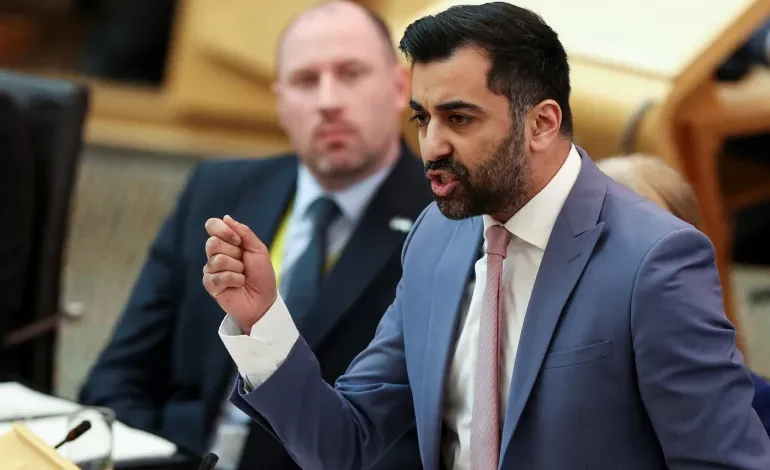
He came to power as a trailblazer – but political goodwill has been in short supply for Scotland’s first minister, Humza Yousaf.
Yousaf, who became the first Muslim leader of any Western democracy when he assumed the helm of the Scottish National Party (SNP) 100 days ago this week, has found the going tough since taking over the reins from his predecessor, Nicola Sturgeon, following her shock resignation after nearly nine years in office.Sturgeon, Scotland’s first female first minister – and first female leader of the SNP, swept to power in late 2014, but ended her tenure earlier this year amid great personal and political turmoil, leaving in tumult a party she had turned into a formidable electoral winning machine.
“The SNP is in crisis, even if some [in the party] are in denial about this …,” James Mitchell, a professor at the University of Edinburgh’s School of Social and Political Science, told Al Jazeera.
“Humza Yousaf has inherited a very different party compared with the party Nicola Sturgeon inherited from [her predecessor] Alex Salmond.”The pro-Scottish independence SNP has been the dominant political force in Scotland since 2007 when the left-wing party secured victory at the devolved Scottish Parliament election under the leadership of Salmond.
In September 2014, an historic constitutional referendum was held, which saw Scottish voters reject independence from the United Kingdom state by 55 to 45 per cent.
Strong and vocal nationalist feeling in Scotland has endured, however, and today the SNP-led administration in Edinburgh and the unionist Conservative Party government in London Westminster remain at loggerheads.
As first minister, Sturgeon – despite her repeated electoral wins at both the Scottish Parliament and Westminster – had cut a beleaguered figure of late, weighed down by her spectacular fallout with her predecessor and mentor Salmond after he was accused (and later acquitted) of sexual assault, the COVID pandemic, Scotland’s polarising gender reform debate and questions surrounding the veracity of the SNP’s internal finances, which are now the subject of a police investigation.
Just last month, Sturgeon, who, during her premiership, also found her attempts to hold a second referendum on Scottish independence repeatedly thwarted by the UK government, was herself arrested – but later released without charge – in connection with allegations of financial misconduct by the SNP during her time in office.Her arrest followed that of her husband, former SNP chief executive Peter Murrell, in April when he was also released without charge pending further investigation.
Against the backdrop of such flux, and presiding over falling SNP poll ratings, Yousaf has been attempting to shore up his battered party by raising the stakes on its raison d’être – Scottish independence.
Speaking at an SNP conference late last month, the 38-year-old first minister, whose loyalty to Sturgeon was tested when he resisted calls from opposition parties to suspend Sturgeon from the SNP following her arrest, set out his strategy to contest the next UK-wide general election by stating that the “SNP will absolutely fight the next election with independence front and centre of our campaign”.
“I think the significance of Humza’s speech was changing the nature of the mandate the SNP might get at the next general election rather than the result,” said Lesley Riddoch, a high-profile campaigner on Scottish independence.
“In the past, independence has not been front and centre of the SNP’s manifesto, leaving them open to the accusation that winning a majority of seats – as they regularly do – doesn’t mean that voters support independence – they might just like Nicola Sturgeon, they might not like Westminster and so on.”But despite the SNP holding the majority of Scottish seats at Westminster (and being the party of government in Edinburgh) opinion polls have suggested that the rise of the Labour Party UK-wide could cost Yousaf’s party dearly at the next British general election (due to take place no later than January 2025).
Indeed, the UK Labour Party are favourites to end the reign of the Conservative Party government led by Prime Minister Rishi Sunak – and current indications are that a Scottish electorate, unimpressed with the SNP’s internal woes, will turn against the nationalist movement in favour of Labour; a prospect that is music to the ears of many committed unionist voters in Scotland.
“I think the SNP has massively changed Scotland in general in an extremely bad way,” David Middleton, a retired oil worker from Edinburgh, told Al Jazeera.
“They are nothing but a strongly nationalist cult … The one simple qualification each [SNP politician] has is an overwhelming desire for independence combined with a mentality that blames every single failure – and there are many – within Scotland on Westminster.”
Of Yousaf’s intention to fight the next election on the cause of independence, Middleton added: “A general election is fought on a massive number of issues which individual constituencies feel strongly about. One cannot have an election based on nothing but a vote for a referendum.”
Yet, for all of the SNP’s woes, support for independence itself remains relatively high – shifting, in recent months, between the 45 and 53 per cent mark.


